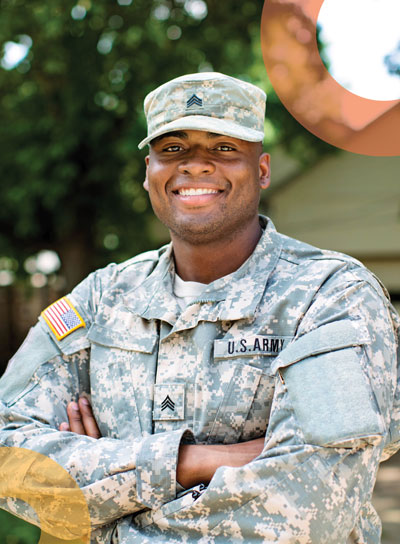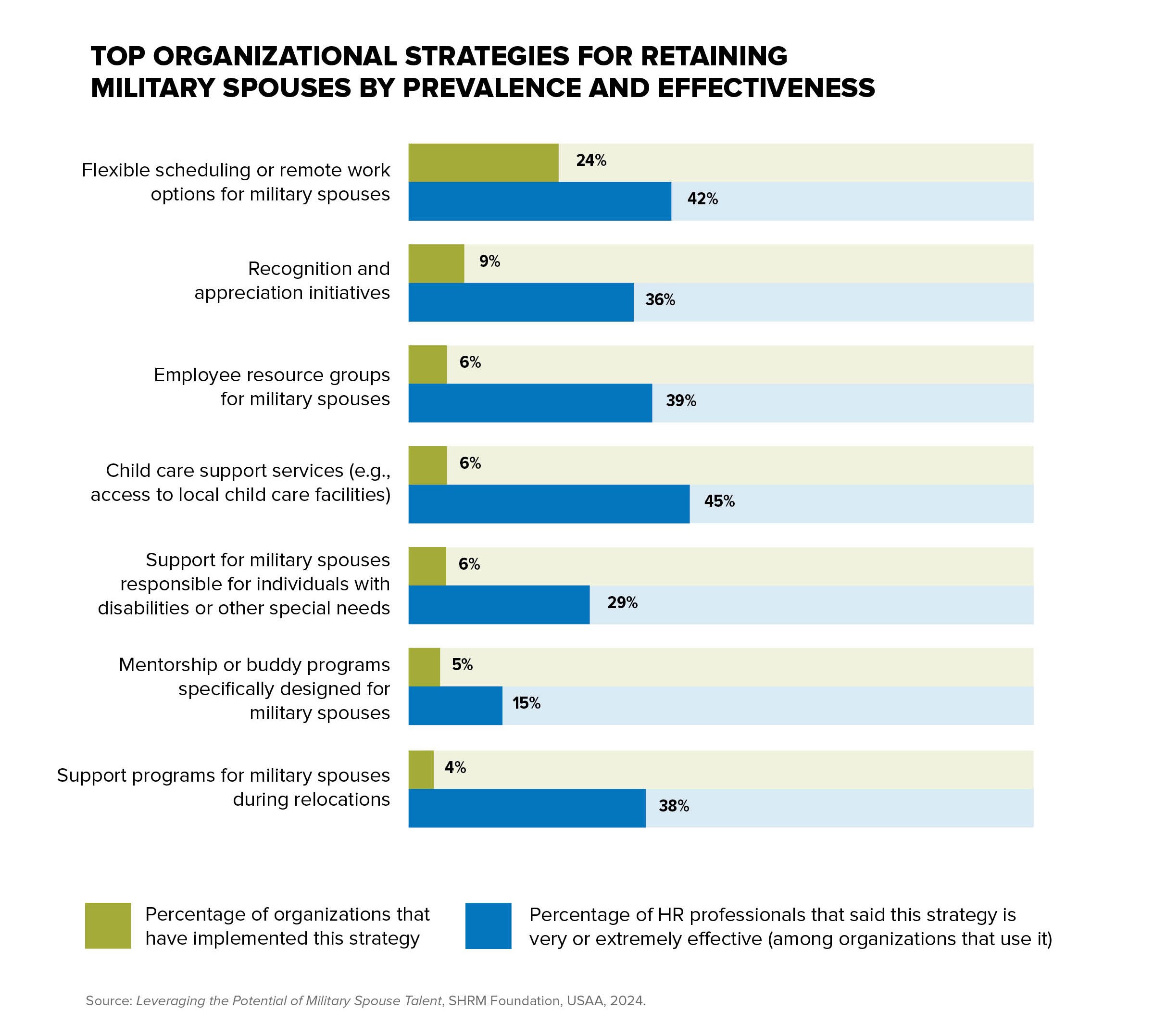Supporting Flexibility: Creating a Military-Friendly Work Culture
Companies open to giving military spouses and veterans the flexibility they need to succeed can benefit from their unique skills.

Logan McIntosh, a communications specialist at T-Mobile, and her husband, a Green Beret in the U.S. Army, were given about three weeks to relocate from the Seattle area to State College, Pa., in spring 2022. “I was so anxious having to go talk to my managers about it,” McIntosh says. “I didn’t know what I would do if I wasn’t able to keep my job.”
But she didn’t need to worry. T-Mobile kept the promise it made when she was hired in 2020—to support military spouses with portable work arrangements when they are ordered to move to a new duty station with their family.
Four years ago, McIntosh was forced to quit her job in New York City when her husband was given orders to report to Washington state. She spent months searching online job boards for roles that would fit her skill set and organizations that would accept her as a military spouse likely facing relocation every few years.
That’s when she came across a page on T-Mobile’s website proudly showcasing the company’s support for military service members and their families. The page specifically addressed the hiring of military spouses. There wasn’t an open role for McIntosh at the time, but she reached out anyway, even sending T-Mobile CEO Michael Sievert an email. His office responded with an introduction to the head of the communications department.
“I was shocked,” McIntosh says. “When I went through the interview, I told them I am a military spouse and there is a possibility I will have to leave the area when my husband is stationed somewhere else. And that can be at a moment’s notice. They assured me that they are in full support of military spouses and would make it work if I were hired.”
That promise was put to the test two years later, when her husband’s new orders initiated her latest move. “I’m very grateful to be working for a company like this,” McIntosh says. “Companies can say they support military service members and their families, but T-Mobile has proven time and again that they mean what they say.”
The telecom provider based in Bellevue, Wash., has repeatedly earned recognition as a military-friendly employer, reaching a five-year goal by the end of 2023 to hire 10,000 veterans and military spouses. It has partnered with organizations including Hiring Our Heroes, Blue Star Families, and One Tribe Foundation that focus on the career pathways, mental health, and well-being of veterans and military spouses. T-Mobile is also an original signatory of the 4+1 Commitment, a nationwide effort to cut down the unemployment rate among military spouses.
‘They’re Just Going to Leave’
Military spouses like McIntosh—92% of whom are women—have long faced employment barriers, leading to high rates of unemployment and underemployment. According to the U.S. Department of Defense, a conservative estimate of the military spouse unemployment rate is 21%. Military spouses report being underpaid, having to work outside their career field, and lacking opportunities for career advancement.
“ ‘They’re just going to leave.’ … I hear this over and over again,” says Alice Riethman, SHRM-CP, an employment attorney and consultant at Kilborn Riethman Consulting in Spokane, Wash., who is the spouse of a U.S. Air Force pilot. “More spouses than I can count have told me that they were denied jobs or had offers rescinded when the employer learned that the person was a military spouse.” Additional challenges for military spouses seeking employment include a lack of a local professional network, gaps in employment, foreign relocations where working at all may be legally prohibited, and licensing and certification issues across states.
Research from SHRM and the SHRM Foundation, sponsored by USAA, revealed that most employers (84%) have no dedicated program for recruiting and hiring military spouses, reflecting a broader lack of awareness about the unique needs of this group. The research also found that nearly 66% of employers have not implemented any strategies to retain military spouses. Among those who have done so, initiatives centered on child care support, flexible scheduling or remote work options, and military-specific employee resource groups (ERGs) were the most effective.
The SHRM Foundation’s free Veterans at Work Certificate program was developed to equip HR professionals, people managers, and business leaders with the knowledge and actionable tools necessary to attract, hire, and retain veterans and members of the military community.
Maintaining Flexibility
“T-Mobile’s commitment to hiring veterans, service members, and their spouses has been longstanding,” says Holli Martinez, vice president and head of diversity, equity, and inclusion (DE&I) at the company. She gives much of the credit for the success of T-Mobile’s hiring initiatives and programs for military spouses and veterans to one of the company’s ERGs—a community of nearly 12,000 veterans, active service members, and military spouses—which launched in 2013.
“The ERG has been a catalyst for so much of what we do related to military hiring,” Martinez says. “We listened to them about their unique needs related to hiring, workplace culture, and HR policies. It’s important for DE&I programs to be authentic and co-created with the relevant populations. If that authentic motivation is not embedded in the culture, it won’t be successful.”
Military veterans face their own set of challenges in transitioning from military service to the civilian work world. Unlike for military spouses, the unemployment rate for veterans is very low, but there can be difficulties aligning military experience to civilian job descriptions, and veterans can face negative perceptions about them.
“I did not talk about my military service while working at previous companies,” says Tana Avellar, a lieutenant colonel and military intelligence officer in the Army National Guard and senior manager at T-Mobile. “There is sometimes a bias about people in uniform—that they are not flexible, that they are authoritarian in leadership style—even their political leanings are questioned.”
Hired in 2016 as a project manager at T-Mobile, Avellar helped shape the company’s military hiring initiative and now co-chairs T-Mobile’s Veterans & Allies Network. “Our ERG is one of the largest areas of support,” she says. “It is a community where veterans and service members can both be a part of and give back, too—paying it forward in service and camaraderie.”
T-Mobile also offers help with resume and skills translation, assistance with understanding corporate benefits for newly transitioning veterans, a mentorship program, and targeted learning and development opportunities focused on employees with a military background.
Military spouse employees with active relocation orders are given an additional week of paid time off (PTO), and service members in the Reserves and National Guard are provided with 20 days of PTO to cover required annual military training. All U.S. employers are required to allow leave for military training and service under the Uniformed Services Employment and Reemployment Rights Act, although it’s not required to be paid. “It’s a tremendous benefit not to have to worry about my paycheck,” Avellar says. “I am able to continue to serve my country and have a thriving career at this company.”
Mental health awareness is another focal point for the military community, impacting veterans and their loved ones. McIntosh spends more time than she would like incommunicado from her husband while he’s deployed for months at a time overseas.
“I deal with a lot of unknowns about where my husband is stationed and what he does because he’s Special Forces,” she says. “And that’s scary. Some days, I need to take a mental health day, and T-Mobile has been there for me.” The company also offers a 24/7 employee assistance program with 10 free counseling sessions for veterans and family members.
Customized Hiring Approaches
Riethman says that when considering hiring miliary spouses, employers first need to rethink how they review resumes, taking the time to better contextualize gaps in employment, more frequent job changes, and inconsistent career progression. “I encourage recruiters to be mindful that the traditional ways many were taught to review resumes is very likely filtering out many highly qualified military spouses,” she says.
That also applies to veterans. The diversity and military sourcing team at T-Mobile makes an effort to understand how a job candidate’s military skills would fit into the organization, Avellar says. For example, her military intelligence background may be mysterious for some recruiters, but it just means she has honed her analytics and leadership skills. Adding a military spouse section to your careers page is another effective tactic for employers—like the one that got McIntosh’s attention when she was searching for a place to land.
Riethman adds that the family support services offices at nearby military installations “are a gold mine” of the talent that military spouses offer, and national job boards such as the Military Spouse Employment Partnership can be a fantastic resource. So can the organizations Hiring Our Heroes and JobPath, which provide support for service members transitioning from the military to a civilian career.
“Being a military spouse is a distinct honor,” Riethman says. “I am continuously struck by the resilience, adaptability, determination, loyalty, and diversity of this remarkable group. Being a military spouse means being infinitely adaptable to whatever happens, making the most of it, and holding a healthy perspective in challenging situations. What organization couldn’t benefit from that?”
Roy Maurer is a senior specialist, B2C Content, at SHRM.





